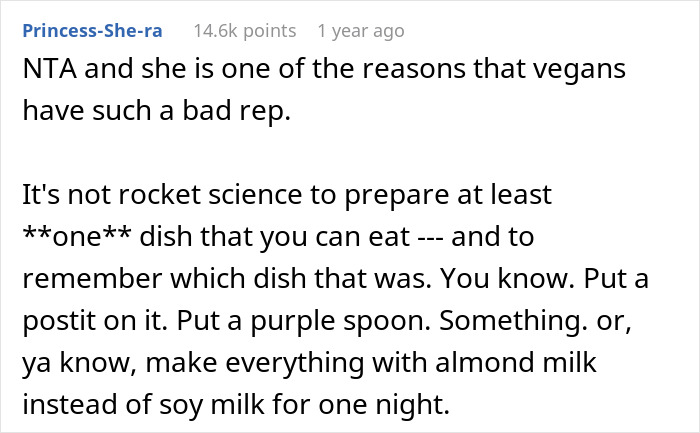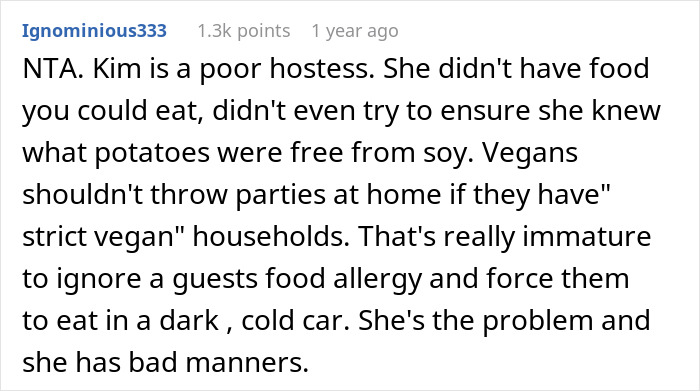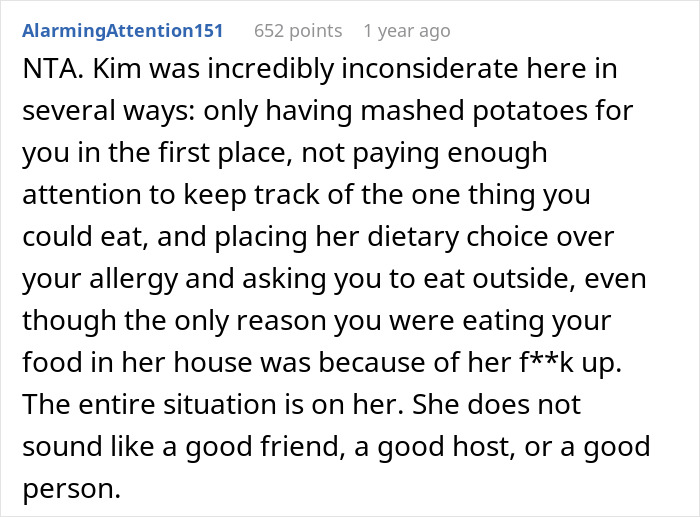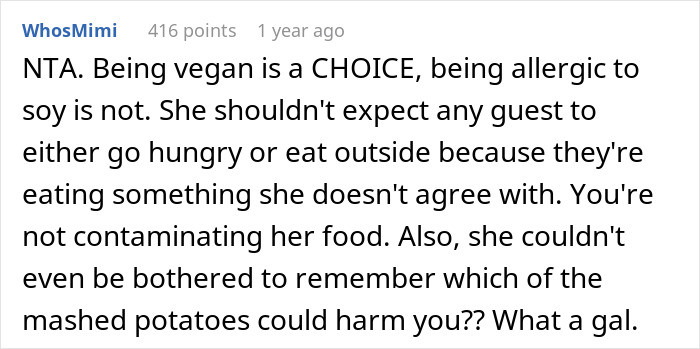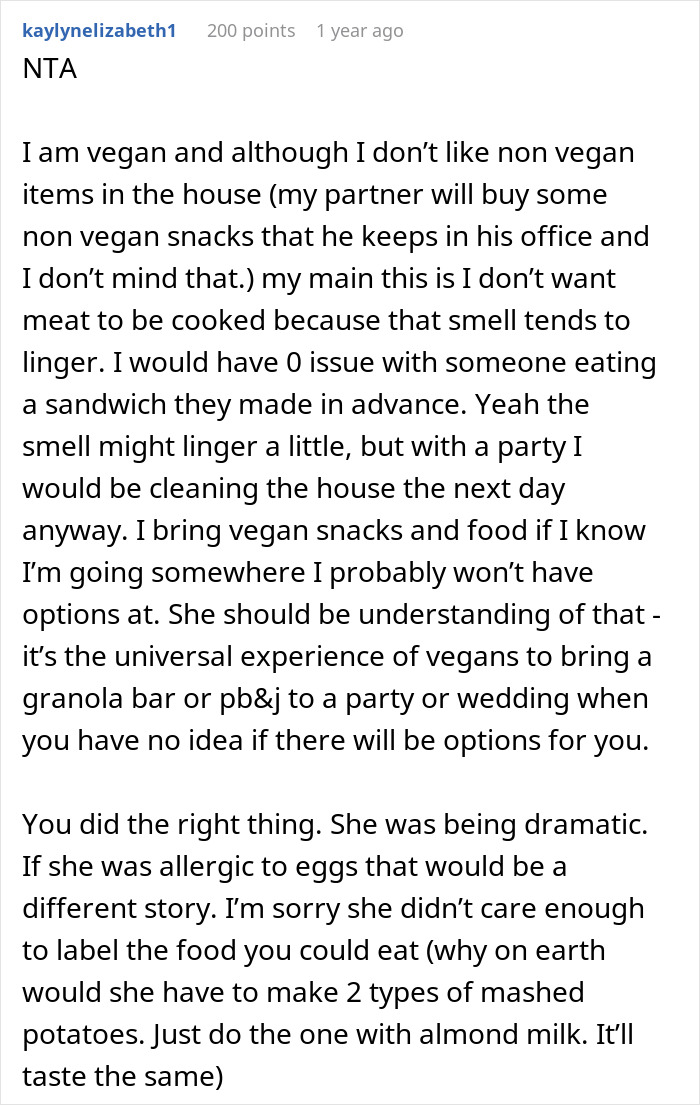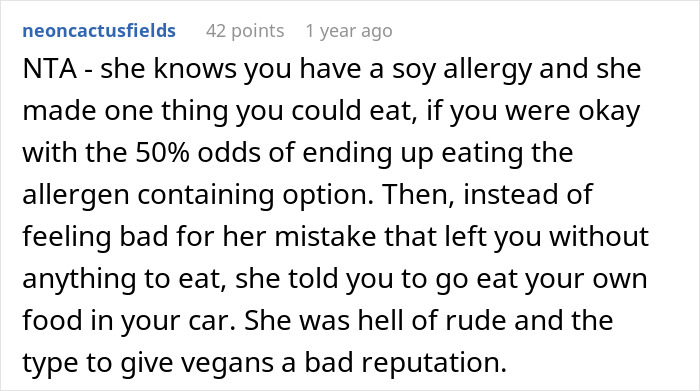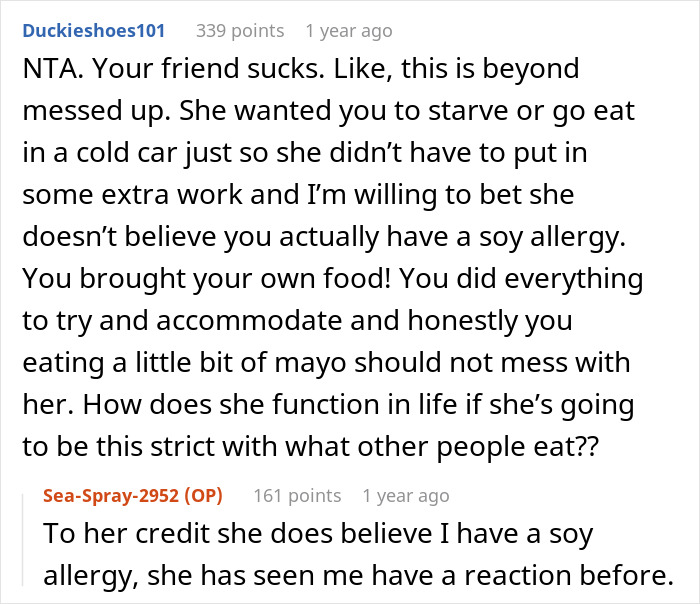Creating a menu for a party can be difficult when your friends have a wide variety of dietary preferences and allergies. But it’s definitely not impossible to accommodate most diets, especially when you’re aware of what ingredients to avoid.
Yet when one person attended a friend’s birthday party that was held in a vegan home, they were left with nothing that they could eat. And instead of being able to simply bring some allergy-free snacks in, they were told that anything with animal products had to stay outside. Below, you’ll find the full story that was posted on Reddit detailing the drama that went down at this birthday party, as well as some of the replies readers shared.
Due to their allergies, this person wasn’t able to eat any of the food served at a friend’s birthday party

Image credits: Veganleonora / reddit (not the actual photo)
But after being told they weren’t allowed to bring in their own snacks, they decided to simply go home
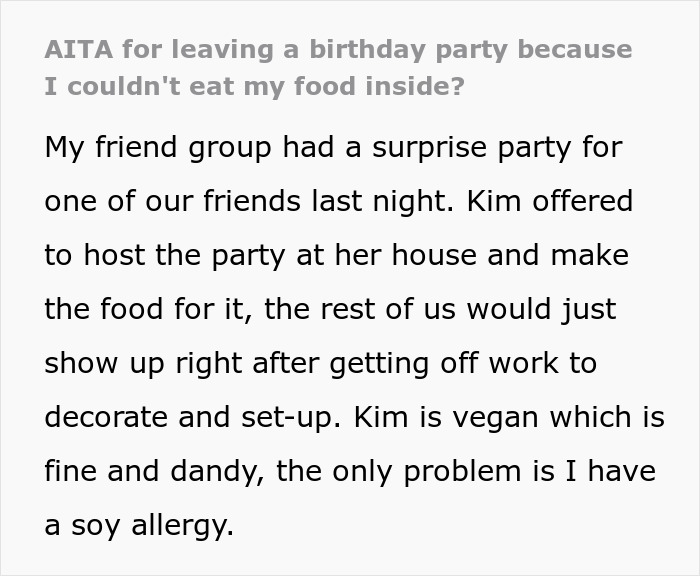



Image credits: NataKor5 / envato (not the actual photo)





Image credits: Sea-Spray-2952
One in ten adults in the United States has a food allergy
If you’re lucky enough to be able to eat whatever you like without ever worrying about checking the ingredients, asking about cross contamination or keeping an epipen on your person just in case, count your blessings. According to Food Allergy Research & Education (FARE) one in ten adults in the United States has a food allergy, along with one in thirteen children.
And many of these allergies are quite dangerous, as over half of adults with food allergies have experienced a severe reaction at some point. When it comes to the most common foods people have to avoid, there are eight top allergens that are responsible for the vast majority of allergies: milk, eggs, peanuts, tree nuts, wheat, soy, fish and shellfish. In fact, at least 90% of serious reactions to food allergies are caused by these top allergens.
Unfortunately, food allergies have also been on the rise for decades. FARE reports that food allergies among children rose by 50% between 1997 and 2011 and shot up another 50% between 2007 and 2021. American kids self-reporting peanut or tree nut allergies went up by a whopping 300% between 2001 and 2017 as well.
But despite how common food allergies are, it’s extremely important to take them seriously. 3.4 million people in the United States are sent to the emergency room every year due to an allergic reaction to food. And over 40% of kids with allergies to certain foods have experienced severe reactions, such as anaphylaxis.
It’s important to take food allergies seriously
If a friend of yours has a food allergy, it’s necessary to take that into consideration when preparing food for them or hosting them in your home. It’s not simply a dietary preference; it is necessary for their health that they avoid these foods.
However, dietary preferences should be respected as well. When someone chooses to live a vegan lifestyle, they make a choice to avoid purchasing or consuming any products that require harming, exploiting or killing animals. No leather, no wool sweaters, and of course, no eating meat, dairy, eggs or honey. It’s not all about food, but that is a major aspect of living a vegan lifestyle, as we all have to eat multiple times a day!
It’s estimated that, currently, about 1% of the global population is vegan. And as someone who has been vegan for about 8 years myself, I can say that it is incredibly easy once you’re used to it. However, it can take time to adjust to the lifestyle, figure out what you like to eat and explain to the people in your life why you’ve made the choice to live more compassionately towards animals.
While it’s understandable that vegans may not want any animal products in their homes, as those non-vegan items conflict with their ethics, vegans should also be empathetic towards others who can’t always eat what’s available at a gathering.
Accommodating a friend’s special diet shows that you care
I can’t tell you how many times I’ve hangrily listened to my stomach grumble through a party or event because there were no vegan options available, even if I was told there would be ahead of time.
Every vegan knows the struggle of having to pack extra snacks, meal prep or have a protein bar as a backup meal, just in case there aren’t any options available without animal products. Given how universal this experience is for vegans, it is surprising that the host of this party had no empathy for her friend who couldn’t eat what she prepared.
In fact, it’s even more shocking that she didn’t ensure that there were plenty of soy-free options available, as it’s extremely easy to avoid soy on a vegan diet if you get a little creative and don’t rely on tofu and soy milk.
At the end of the day, it may not always be easy to accommodate our friends who have different dietary preferences or allergies than we do. But with a little research and effort, it’s possible. And it’s definitely worth it to show a friend that you care.
We would love to hear your thoughts on this situation in the comments below, pandas. Do you think this person was wrong for leaving the party early? Feel free to share, and then if you’re interested in checking out another Bored Panda piece discussing dietary drama, look no further than right here!
Readers had plenty to say about the story, and the author chimed in to share even more details
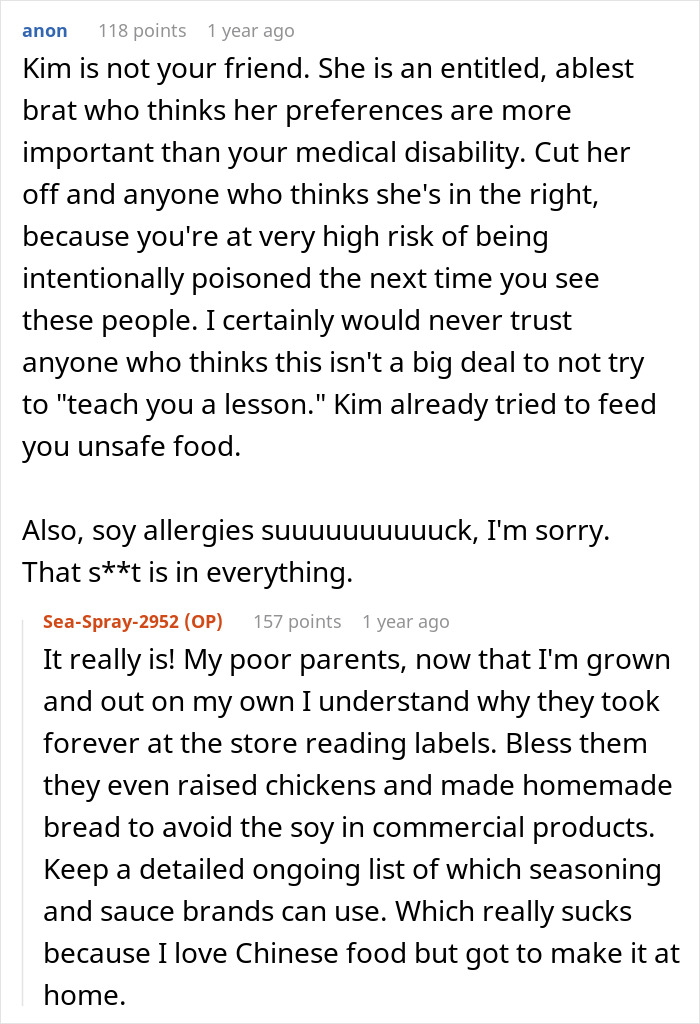
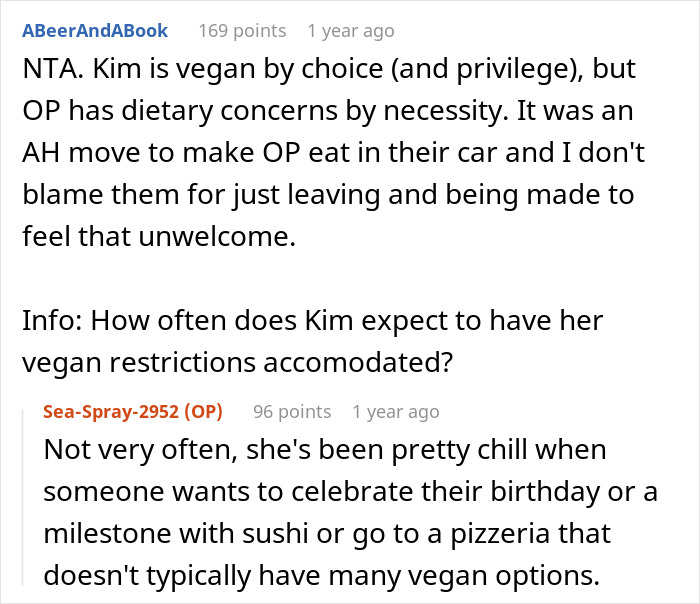
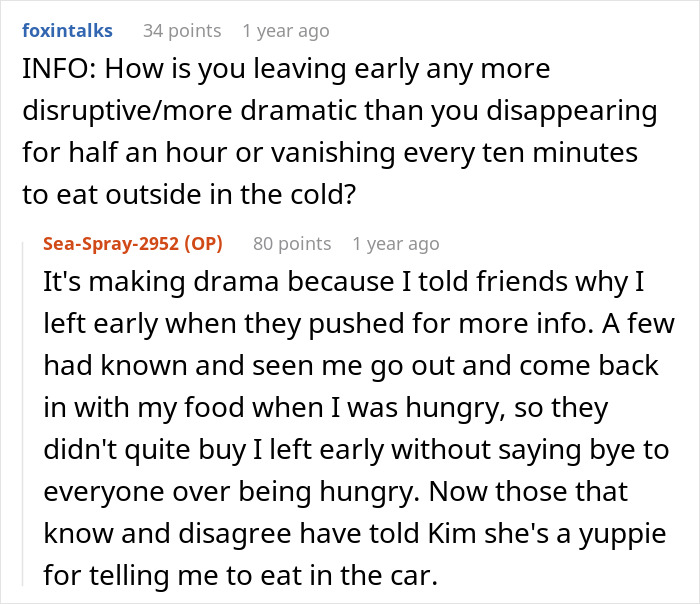
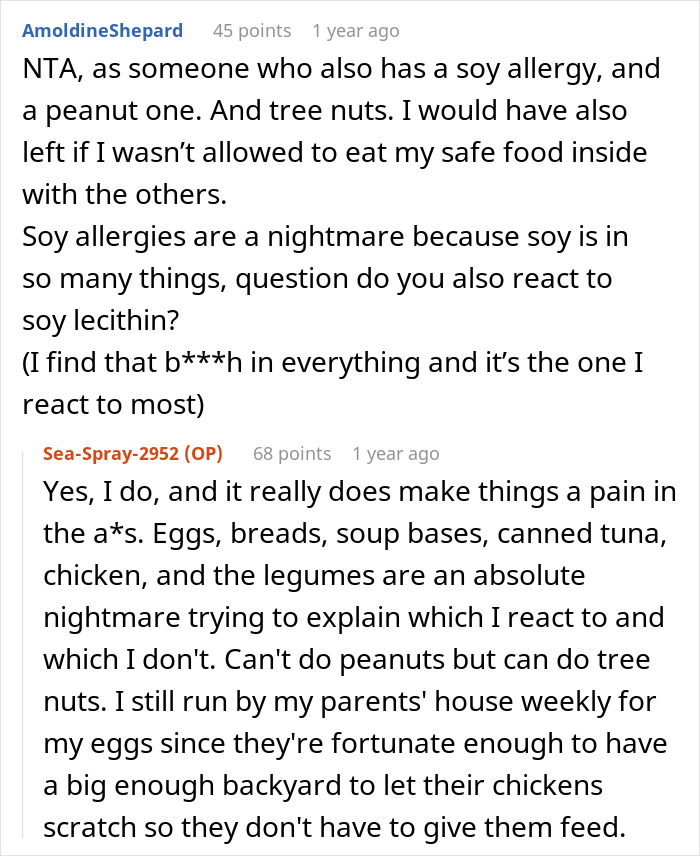
Readers continued sharing their thoughts and calling out the host for refusing to accommodate her friend
